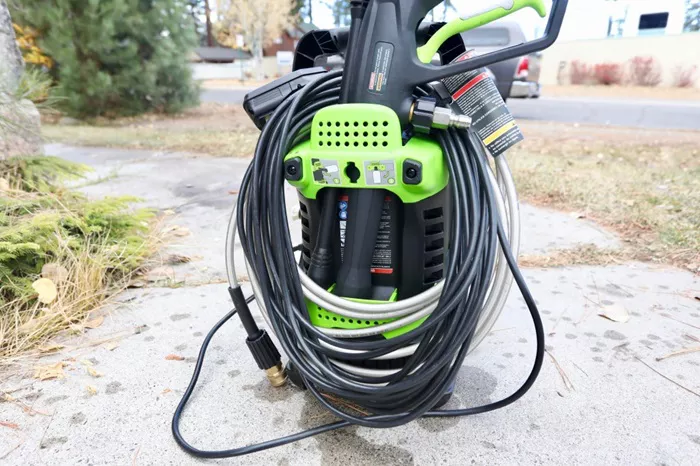The Greenworks GPW1501 is a powerful and efficient electric pressure washer designed to handle a wide range of cleaning tasks. In this article, we will dive into the key features, benefits, and limitations of the Greenworks GPW1501, helping you decide whether it is the right choice for your cleaning needs.
Overview of the Greenworks GPW1501
The Greenworks GPW1501 is a compact and highly effective electric pressure washer. It offers a blend of performance and convenience, making it suitable for various outdoor cleaning tasks. From cleaning vehicles to washing patios, this machine promises to deliver consistent results with its impressive pressure output and user-friendly design.
Key Features of Greenworks GPW1501
- 1500 PSI Pressure: With a pressure rating of 1500 PSI, the GPW1501 can effectively tackle dirt, grime, and stains on a variety of surfaces.
- 1.2 GPM Water Flow Rate: The 1.2 GPM (gallons per minute) water flow ensures that the pressure washer can clean efficiently while conserving water.
- Electric Powered: This model is powered by electricity, eliminating the need for gas or oil, making it an eco-friendly and low-maintenance option.
- Lightweight and Portable: Weighing just 16 pounds, the GPW1501 is easy to move around and store when not in use.
- Versatile Nozzles: The washer comes with multiple nozzle options, providing flexibility to adjust the spray pattern for different cleaning tasks.
How Does the Greenworks GPW1501 Compare to Other Pressure Washers?
When comparing the Greenworks GPW1501 with other pressure washers on the market, it stands out due to its lightweight design and electric-powered efficiency. It is ideal for homeowners or those with light to medium-duty cleaning tasks. While it may not be as powerful as some gas-powered models, it strikes a balance between power and portability.
Pressure Washer Brands to Consider
If you’re considering the Greenworks GPW1501, it’s important to also explore other pressure washer brands available in the market. Brands like Sun Joe, Karcher, and Ryobi offer competitive models with similar features, allowing you to choose the best option based on your specific needs.
Benefits of the Greenworks GPW1501
1. Eco-Friendly and Low Maintenance
The Greenworks GPW1501 operates on electricity, eliminating the need for gas or oil. This makes it a cleaner and more eco-friendly option compared to gas-powered pressure washers. Moreover, the electric motor requires less maintenance, reducing long-term costs.
2. Cost-Effective
At a relatively affordable price point, the GPW1501 offers great value for homeowners looking for a budget-friendly cleaning solution. It provides reliable power without the high initial investment associated with larger, gas-powered models.
3. Compact and Lightweight
One of the key advantages of the Greenworks GPW1501 is its portability. Weighing just 16 pounds, it is easy to move and store. This is a significant benefit for people with limited storage space or those who need to move the machine around frequently.
4. Quiet Operation
Unlike gas-powered models, the GPW1501 operates quietly. This is ideal for residential areas or situations where noise could be a concern. You can clean your driveway or car without disturbing your neighbors.
Potential Drawbacks of the Greenworks GPW1501
1. Limited Pressure
While the 1500 PSI rating is sufficient for many household cleaning tasks, it may not be powerful enough for heavy-duty jobs, such as cleaning large surfaces with stubborn stains. For more demanding tasks, a higher PSI pressure washer may be more appropriate.
2. Shorter Hose Length
The GPW1501 features a 20-foot high-pressure hose, which is shorter compared to some other models. While this length is fine for smaller cleaning tasks, it may be limiting for larger areas or high-reach applications.
3. Water Supply Limitations
Since this model relies on a water supply, you will need to have access to a consistent water source, such as a garden hose. This might not be convenient for all users, especially in locations where water access is limited.
Pressure Washer Uses
The Greenworks GPW1501 is designed for a variety of cleaning tasks. Some of the common pressure washer uses include:
- Washing Cars: The GPW1501 is ideal for cleaning vehicles, including cars, trucks, and bikes, removing dirt, grime, and other build-ups.
- Driveways and Patios: This pressure washer is effective for cleaning driveways, patios, sidewalks, and other outdoor surfaces, removing dirt, oil stains, and moss.
- Fences and Decks: The pressure washer can also be used to clean wooden fences and decks, helping restore their appearance.
- Outdoor Furniture: Cleaning outdoor furniture such as chairs, tables, and grills is made easy with the Greenworks GPW1501.
Pressure Washer Pros and Cons
As with any product, the Greenworks GPW1501 comes with its set of pros and cons. While it offers numerous benefits such as being eco-friendly, portable, and cost-effective, it may not be the right choice for users who require more power for heavy-duty cleaning tasks.
Pros
- Lightweight and easy to transport
- Affordable and cost-effective
- Quiet operation and eco-friendly
- Great for light to medium-duty cleaning tasks
Cons
- Limited pressure for heavy-duty jobs
- Shorter hose length
- Requires a consistent water source
Conclusion
The Greenworks GPW1501 is a solid choice for homeowners looking for an affordable, efficient, and easy-to-use pressure washer for everyday cleaning tasks. Its electric design makes it eco-friendly, while its lightweight structure adds convenience for users. While it may not be suitable for heavy-duty jobs, its versatility makes it a popular option for light to medium cleaning tasks.
Before making your decision, it’s important to consider other pressure washer types and how the Greenworks GPW1501 fits within your needs. Whether you’re cleaning your driveway, vehicle, or outdoor furniture, the Greenworks GPW1501 is a reliable option for maintaining a clean and tidy home environment.
Related topics:
- Does Pressure Washer Use Less Water?
- Do Power Washers Need to Be Connected to a Hose?
- Are Pressure Washers Dangerous?

